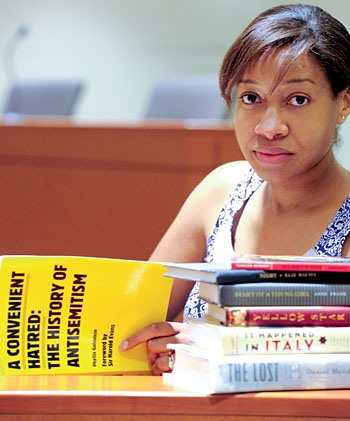
By connecting literature and history to the current state of the human condition, educators are creating unique perspectives to help students learn how to make a difference on social justice issues important to them.
Thea MacFawn, who teaches 10th grade English, is partnering with 10th grade global studies teacher Dan Weaver, both members of the North Colonie Teachers Association, to develop interconnected lesson plans on human rights-oriented issues, such as "the nature of power, justice and those larger topics that fit in with English and social studies curricula," MacFawn said. The lessons are being designed to meet the Common Core Learning Standards.
"Literature is a reflection of human experience," she said. "Whether it is fiction or biography, it tells you something about that time period. It's important for my students to have context."
MacFawn is drawing on her experience this summer as one of 20 teacher fellows, including two others from New York state, selected for an intense weeklong study program at the United States Holocaust Memorial Museum in Washington, D.C.
"The Holocaust is a historical event that, as a society and a culture, we are still learning from," she said.
Participants learned about the horrific chain of events from 1933 to 1945 when 11 million people, including 6 million Jews and 5 million others, including political opponents to the Nazi party, Soviet prisoners of war, gypsies, Slavic peoples, Jehovah's Witnesses and homosexuals, were systematically persecuted and murdered. They explored how these events connect to past and present genocide, and how to use the understanding of these events to affect powerful societal change.
"We plan to complement as much as we can throughout the year," said Weaver, a 19-year teaching veteran. His lessons will begin with the French Revolution and the rights of the French people, with MacFawn providing complementary literature.
To prepare students for MacFawn's class on Holocaust-based literature, such as Elie Wiesel's Night or Sonia Weitz's memoir, I Promised I Would Tell, Weaver plans to enhance and expand students' understanding of the events leading to the Holocaust; including Hitler's rise to power, the enactment of anti-Semitic laws and creation of concentration camps.
Having that context will help students parse the literature more easily, make stronger thematic connections and facilitate critical thinking — an important component of Common Core.
MacFawn also will include lessons based on the museum's new exhibit "Some Were Neighbors: Collaboration and Complicity in the Holocaust," which explores the role ordinary people had in the Holocaust and adds complexity to her students' understanding of the events.
"They will see that it is not so easy to separate good and evil," she said. A Holocaust survivor, a professor of Armenian Holocaust studies and a Rwandan genocide survivor will speak to her students as well.
To help the class see ways in which they can make a difference, even from a North Colonie classroom, students will create and implement community outreach projects. These may include a presentation on contemporary genocide to raise awareness, fund-raising activities or community service for a local charity.
"These efforts build a sense of empathy and desire to act on behalf of others and to give back something," she said.
FOR MORE INFO
The United States Holocaust Memorial Museum website has several resources for educators to explore how Holocaust history and contemporary issues of genocide and anti-Semitism can be included in their curricula.
The site has links to Holocaust lesson plans, guidelines for teaching about the Holocaust, an online educator workshop and video testimony from Holocaust survivors and collaborators. Visit www.ushmm.org/education/ foreducators/ to learn more.
To find out how to apply to become a museum teacher fellow, visit www.ushmm.org/education/foreducators/prodev/teacherfellowship/.